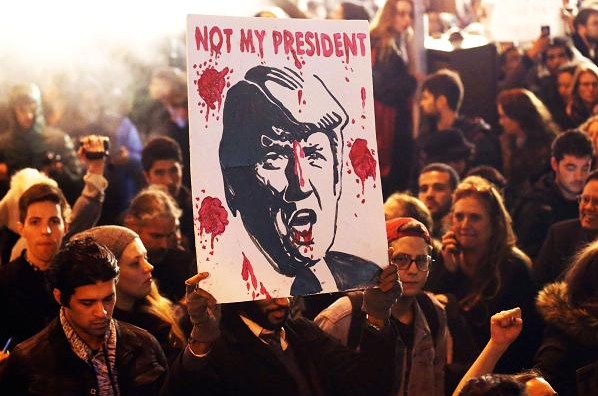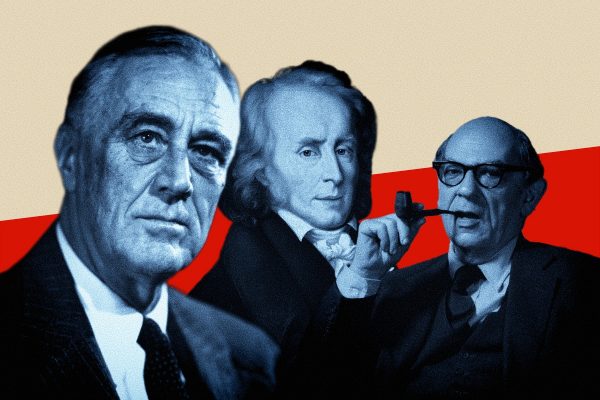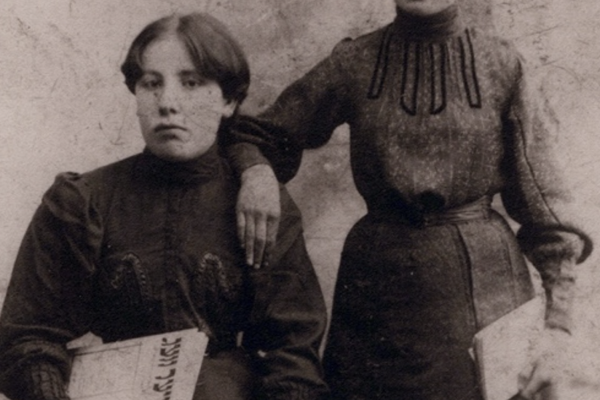In 40 percent of our recent presidential elections, the Electoral College and the national popular vote have failed to align. As of this writing, Hillary Clinton leads in the popular vote in the 2016 election by over 2.5 million votes. By historical standards this is not a small margin. It is almost five times greater than the margin by which Al Gore bested George W. Bush in the popular vote. It exceeds Kennedy’s over Nixon, Nixon’s over Humphrey, and Carter’s over Ford. It will come close to equaling Bush’s margin over Kerry. Yet unlike Kennedy, Nixon, Carter, or Bush, Hillary Clinton will not become president. Instead Donald Trump, like Bush before him, will win the Electoral College despite losing the popular vote. Trump has no groundswell of popular support sweeping him into the White House. It is only because of the peculiarities of the Electoral College that Trump will become president.
There are two forms of democratic legitimacy in America: the formal legitimacy that the Electoral College confers and the popular legitimacy that only the people can confer. Both matter in a well-functioning democratic polity. But we should not confuse them. Nor should we be willing to sacrifice one at the altar of the other. There can be little grounds for denying that the Electoral College will bestow formal legitimacy on Trump. He has not usurped the powers of the presidency through anti-constitutional means; he has won them through a constitutionally prescribed and sanctioned procedure. But the Electoral College alone cannot confer popular legitimacy upon Trump or any other would-be president. Only the people as a whole, through an expression of the popular will, can bestow it.
The Electoral College cannot confer popular legitimacy upon Trump. Only the people as a whole, through an expression of the popular will, can bestow it.
The discrepancy between formal and substantive legitimacy can be a very big deal indeed. A president elected with only 23 percent popular support would still be president. But even when the Electoral College and the popular vote are in apparent alignment, that alignment can be surprisingly precarious. For example, five million votes separated Barack Obama and Mitt Romney in the popular vote. Given that margin, it would be a stretch to call the 2012 presidential election a particularly close one. But because of the peculiarities of the Electoral College, a shift in just three hundred thousand votes in four states would have made Romney, rather than Obama, the president. Similarly John Kerry would have defeated George Bush in the Electoral College with a shift of fewer than a hundred thousand votes in Ohio.
The Electoral College should not have the power to override or thwart the manifest will of the people. Certainly none of the common defenses typically offered on its behalf stand up to critical scrutiny—not appeals to the supposed “protections” the Electoral College affords minority populations; not the oft-repeated claim that the Electoral College ensures that all regions of the country, rather than just the coasts, will have a voice in our elections; not the inordinate fear that without the Electoral College the will of the people will be manipulated by tyrants and despots. While the vices of the Electoral College are many, its virtues are exactly zero. It violates the principle of “one person, one vote,” a bedrock principle of representative democracy. Moreover in all elections, and not just closely contested ones, it severely distorts the incentive structures of both voters and vote-seeking politicians alike. It does so by signaling that some votes matter more than others. Voters who matter less have less incentive to participate than they otherwise might. Vote-seeking politicians have less incentive to pursue and mobilize voters who do not matter. Especially when awarded on a winner-takes-all basis, the electoral votes of swing states are enormously tempting prizes because small differences in turnout can make huge differences in electoral outcomes. By contrast, in a national plebiscite in which votes won in one locale would compensate for votes lost in another, the incentives for local voter suppression would be seriously diminished.
Abolishing the Electoral College would undo these perverse incentives and would likely spur greater democratic participation and engagement. Consider Texas. Despite the fact that Clinton spent hardly a day or a dollar there, Hispanics in the state turned out to support her in very large numbers, bringing her closer to winning the state than any recent Democrat has come. But because Texas was a safely Trump state, Clinton stood to gain no electoral advantage by targeting such voters. Anything short of the eight hundred thousand or so additional votes she needed to carry Texas outright was just so much wasted overage that could not be used to offset the few thousand votes by which she lost Pennsylvania, Wisconsin, and Ohio combined. In a truly national election, in which all votes matter equally regardless of where they are cast, maximizing the Texas Hispanic vote—or the votes of any other group, wherever they are—would be an important element of a winning strategy. The broader point is that in a national plebiscite, candidates would have to prospect for votes in every nook and cranny of our vast and divided nation. Democrats would seek to maximize black turnout all over the solidly Republican South. Republicans would seek votes in the exurbs, small towns, and farm counties of even the most solidly blue states. There is no good reason—at least none rooted in concerns about democratic legitimacy—to short-circuit the nationwide search for votes by valuing those of citizens in safe states such as Texas or California less than votes in the contested states of Ohio or Wisconsin.
In 2012, Trump sent forth a flurry of tweets decrying the anti-democratic character of the Electoral College because he feared it would hand Obama the presidency. Now he cannot bring himself to bite the hand that fed him a presidency he would otherwise have lost.
Part of the problem is that the electoral and legislative representation that states receive has not kept pace with population changes. The twenty-five smallest states, which control half of all Senate seats, presently contain only 16 percent of the total U.S. population. By contrast California, with 39 million people—12 percent of the U.S. population—controls only two Senate seats. Even the House of Representatives has become less representative and more anti-democratic than the framers could foresee. Thanks to a combination of the Constitution’s guarantee of at least one member for each state, the permanent capping of the size of the House via legislation, the gerrymandering of districts, and the clustering of urban populations, the House now works at a far remove from the principle of one person, one vote.
The Electoral College is even worse. California has sixty-nine times the population of Wyoming, yet it has only eighteen times the voting power in presidential elections. If the electoral weight of California were proportional to its population as determined by Wyoming, it would have on the order of two hundred electoral votes. The twenty-three smallest states, whose combined population is roughly equal to California’s, have 102 electors between them, while California has only 55.
Because of this it is sometimes said that abolishing the Electoral College would mean that New York and California would decide elections year after year. But this argument is flawed in two ways. First, it overestimates the size of New York, California, and other coastal states relative to the rest of the nation. Second, and more importantly, it betrays a deep misunderstanding of the nature of a truly national election. With the abolition of the Electoral College, presidential elections would no longer be a series of state-by-state plebiscites. From an electoral point of view, the difference between living in California, New York, Wyoming, or Nevada would vanish. The people as a whole, independent of where they live, would deliberate together over electing the next president. The winner of such a national plebiscite could claim a degree of popular legitimacy that the Electoral College is powerless to bestow.
The Electoral College was, in fact, never intended to bestow popular legitimacy on the president. In both conception and execution, it is now and has always been a thoroughly anti-democratic device. Even Donald Trump agrees: in 2012, when he feared that Obama might win the presidency through the Electoral College while losing the popular vote, Trump sent forth a flurry of tweets decrying the anti-democratic character of the Electoral College. He even urged a massive march on Washington to protest the illegitimacy of the electoral process that bestowed the presidency on Obama. Of course Trump now wants to have it both ways. In a recent 60 Minutes interview, Trump derided the Electoral College for its anti-democratic nature. Later on Twitter he praised what he saw as its “genius.”
Whatever his earlier avowed scruples, Trump cannot bring himself to bite the hand that fed him a presidency he otherwise would have lost.
The abolition of the Electoral College will not be easy to achieve. It is entrenched, serving the political interests of those who fear democracy and benefit from its absence. Unfortunately a constitution explicitly designed to foster stalemate, stasis, and reaction—rather than responsiveness to the people at large—gives anti-democratic constituencies power to block even the most far-reaching and urgently demanded changes. Therefore, if we are to accomplish our aims, we must be like the abolitionists of old. We must speak clearly and persistently on behalf of a principle: one person, one vote. Though we may have little chance of dislodging Trump, we can at least fight the mechanism that enabled him to win the presidency against the manifest will of the people.
Whenever the constitution is assailed, Americans tend to invoke the unimpeachable wisdom of its framers. But it is important to know that the framers themselves had no such reverence for the will and wisdom of the people. In their eyes the people were all id and no superego. And though they did seek to safeguard certain fundamental liberties, they also took great pains to shield the government from what they regarded as the undue influence of the people. That is, in part, why they erected the elaborate superstructure of a divided central government, designed primarily for stasis and reaction rather than responsiveness and change. This elaborate superstructure was intended not only to block the consolidation of power in the hands of a few, as is often acknowledged, but also to serve as a sort of national superego that would thwart and channel the untamed will of the people.
Against this backdrop of a thoroughgoing contempt for and fear of the citizenry, it is hardly surprising that the last thing the framers intended was for the president to be chosen by a plebiscite. The election of the president was to be left to a small cabal of wise men, chosen by states in whatever manner they saw fit to employ. It was not until South Carolina was readmitted after the Civil War that states first held statewide plebiscites to choose who would serve as their electors. These procedures were supposed to ensure that “the office of president will never fall to the lot of any man who is not in an eminent degree endowed with the requisite qualifications,” in the words of Alexander Hamilton. The Electoral College has never once functioned in the intended way. Thus the Electoral College is not only anti-democratic in conception and function, it is also an utterly failed and discredited experiment. Instead of protecting us from would-be tyrants, as the framers hoped it would, the Electoral College will be delivering the presidency into the hands of just the sort of person that the framers wished to avoid. And ironically, it has done so in direct contravention to the popular will.
There was a time when the Electoral College, as well as bodies such as the Senate, served very real and urgent political functions. Without them the unlikely union between the states of the slaveholding agrarian South and the free industrial North would probably not have been possible. Union was possible only as long as the South and its peculiar institution could be shielded from the political weight of the North. One of the many keys to safeguarding slavery was the Electoral College. In his notes to the Constitutional Convention, James Madison argued that “the right of suffrage was much more diffusive in the Northern than the Southern States; and the latter could have no influence in the election on the score of the Negroes.” His meaning was clear. Southern states demanded electoral power proportional to their population—including their massive but disenfranchised slave populations. The North would have none of it, on the grounds that slavery should not be used as a ruse to increase the electoral power of the South. But a bargain was struck. The people would not elect the president directly. For if they did, the more “diffusive” suffrage of the North would guarantee northern domination of that office. Instead states would be accorded power to influence the choice of president in proportion to their populations. An enslaved person, however, would only count as three-fifths of a person for the purposes of apportioning that power. Thus were democracy and the popular will sacrificed at the altar of the Union. The fateful bargain paid almost immediate dividends for the South, allowing the slave-owning Thomas Jefferson to defeat the abolitionist John Adams in the election of 1800, thanks entirely to the Electoral College. The limitations of the bargain soon became apparent, once payment finally came due, in a paroxysm of violence and rebellion that brought the entire constitutional order to a halt.
Without the Electoral College union between the slaveholding agrarian South and the free industrial North would not have been possible.
A reconstituted nation did eventually emerge from the ruins of the old. It ended slavery, extended suffrage to the enslaved and their descendants, and for the first time endowed the citizen qua citizen with equal privileges and immunities. But for all its newfound virtues, the amended Constitution was still sullied by many of the anti-democratic features of the original. And largely because of the power with which those measures eventually endowed a reconstituted South, the new nation struggled for yet another century with the same old issues, though in a new guise. Where only the violent rupture of war had ended slavery, new ruptures—less violent, but no less intense and wrenching—were necessary to fuel the nation’s progress toward a more inclusive democracy.
Ironically we are now confronted with a terrifying manifestation of the id—not in the form of the untamed will of the people, as the founding fathers feared, but in the form of Trump himself. In word and in deed, he promises to be regulated and constrained not by the elaborate constitutional checks and balances put in place by the founding fathers, but only by his own appetites. In the face of this nightmare, let us heed the advice of 2012 Trump, rather than the self-serving rationalizations of 2016 Trump. In 2012 Trump issued an urgent call to arms to all who love democracy to stand up and be counted. Let us answer that call.
The Electoral College can only be eliminated by a constitutional amendment, which even in the best of times is an extraordinarily arduous task. But abolishing the Electoral College is urgent. Democracy itself is at stake. What is needed in this moment is not patience and trust in the constitutional mechanisms by which our founding fathers sought to lull us into political complacency. What is needed now is mass mobilization by the people. Let us march on Washington and demand that the Electoral College be abolished.
Only the people at large can send the clear and unmistakable message that Trump lacks the endorsement and backing of the popular will. Whatever other honors and powers the Electoral College gives the president, this it cannot bestow.








